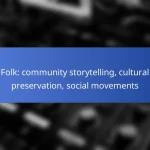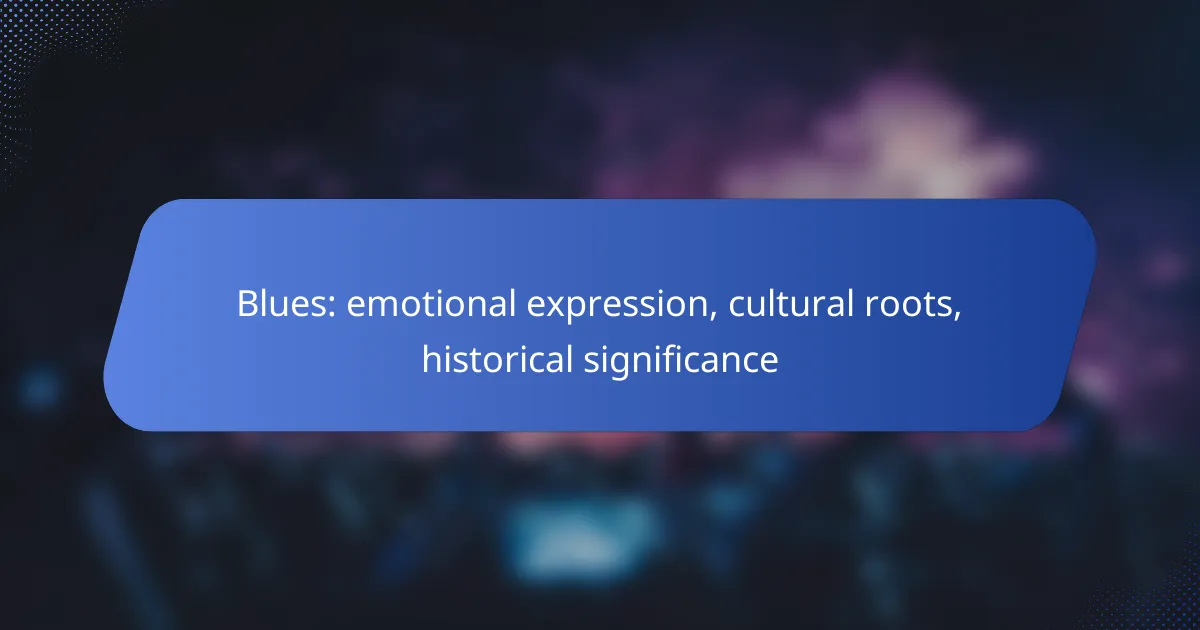The influence of classical education on cultural heritage is profound, particularly in fostering an appreciation for ancient texts and philosophies that shape contemporary thought. By integrating classical studies into modern curricula, students gain a deeper understanding of history, art, and ethics, enhancing their connection to both local and global cultures.

How does classical education influence cultural heritage in Australia?
Classical education significantly shapes cultural heritage in Australia by fostering an appreciation for ancient texts and philosophies that inform contemporary thought. This educational approach enriches students’ understanding of history, art, and ethics, thereby enhancing their connection to both local and global cultures.
Integration of classical texts in curricula
In Australian schools, classical texts such as works by Homer, Plato, and Virgil are often included in literature and history courses. This integration allows students to engage with foundational ideas that have influenced Western civilization. By studying these texts, learners gain insights into themes of morality, governance, and human experience that remain relevant today.
Schools may adopt various teaching methods, including discussions, essays, and creative projects, to explore these classical works. This diverse approach helps students develop a deeper understanding of the texts and their impact on modern society.
Promotion of critical thinking skills
Classical education emphasizes the development of critical thinking skills through the analysis of complex texts and ideas. Students are encouraged to question assumptions, evaluate arguments, and articulate their thoughts clearly. This analytical approach prepares them for real-world challenges, fostering a mindset that values inquiry and reason.
For example, engaging with philosophical arguments from classical sources can help students learn to construct and defend their viewpoints. This skill is essential not only in academic settings but also in everyday decision-making and civic engagement.
Enhancement of cultural awareness
Studying classical education in Australia enhances cultural awareness by exposing students to diverse historical perspectives and traditions. This awareness fosters respect for different cultures and encourages students to appreciate the richness of their own heritage. Understanding classical influences can also help students navigate contemporary cultural discussions.
Schools often incorporate projects that explore the connections between classical ideas and Australian identity, such as examining the impact of Greek and Roman art on local artists. This connection helps students see the relevance of classical education in their own cultural context.
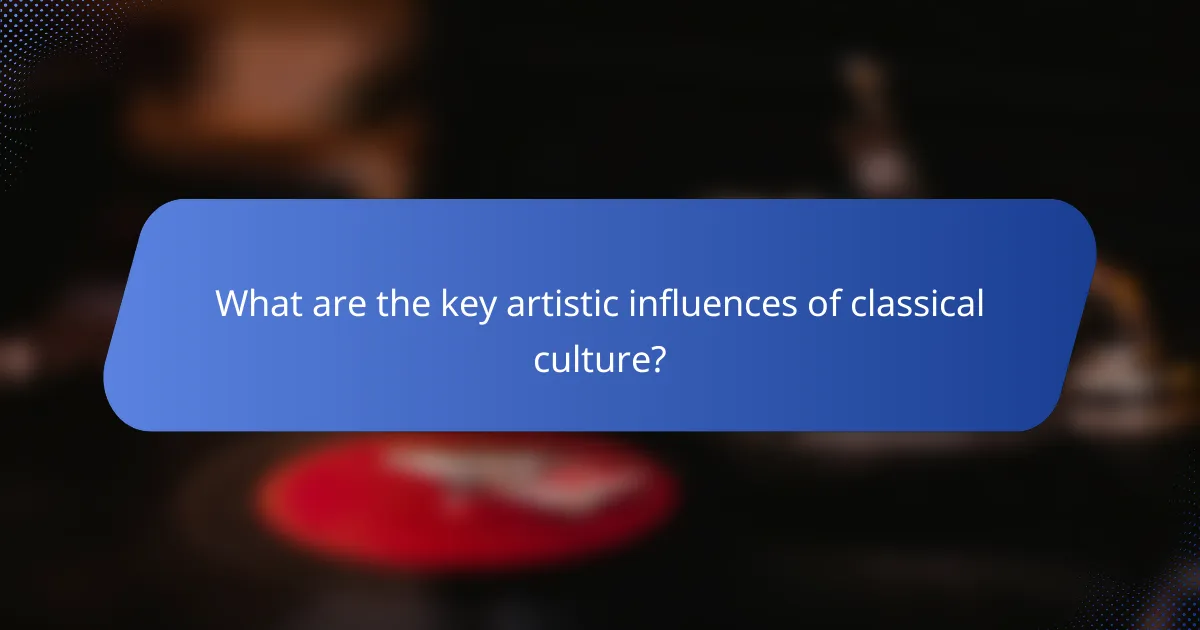
What are the key artistic influences of classical culture?
Classical culture has profoundly shaped various artistic domains, emphasizing ideals of beauty, harmony, and proportion. Its influences are evident in visual arts, performing arts, and literature, where ancient themes and techniques continue to inspire contemporary creators.
Impact on Australian visual arts
The influence of classical culture on Australian visual arts is significant, particularly in the use of classical themes and techniques. Artists often draw inspiration from ancient Greek and Roman aesthetics, incorporating elements such as symmetry and idealized forms into their work.
For example, many Australian sculptures and public artworks reflect classical styles, emphasizing grandeur and narrative. Institutions like the National Gallery of Australia showcase pieces that highlight this connection, making classical influences accessible to the public.
Influence on performing arts
Classical culture has left a lasting mark on Australian performing arts, particularly in theatre and dance. Many productions adapt classical texts, reinterpreting works by playwrights such as Sophocles and Euripides, which resonate with modern audiences.
Additionally, ballet and contemporary dance often incorporate classical techniques, emphasizing grace and discipline. Festivals and competitions frequently celebrate these classical roots, fostering a vibrant performing arts scene that honors its heritage.
Role in literature and poetry
In Australian literature and poetry, classical culture serves as a rich source of inspiration. Many authors reference classical mythology and themes, exploring universal human experiences through this lens. This connection enriches the narrative depth and cultural relevance of their works.
Poets often employ classical forms and structures, such as the sonnet or epic, to convey their messages. This blending of classical elements with local themes creates a unique literary landscape that reflects both heritage and contemporary issues.
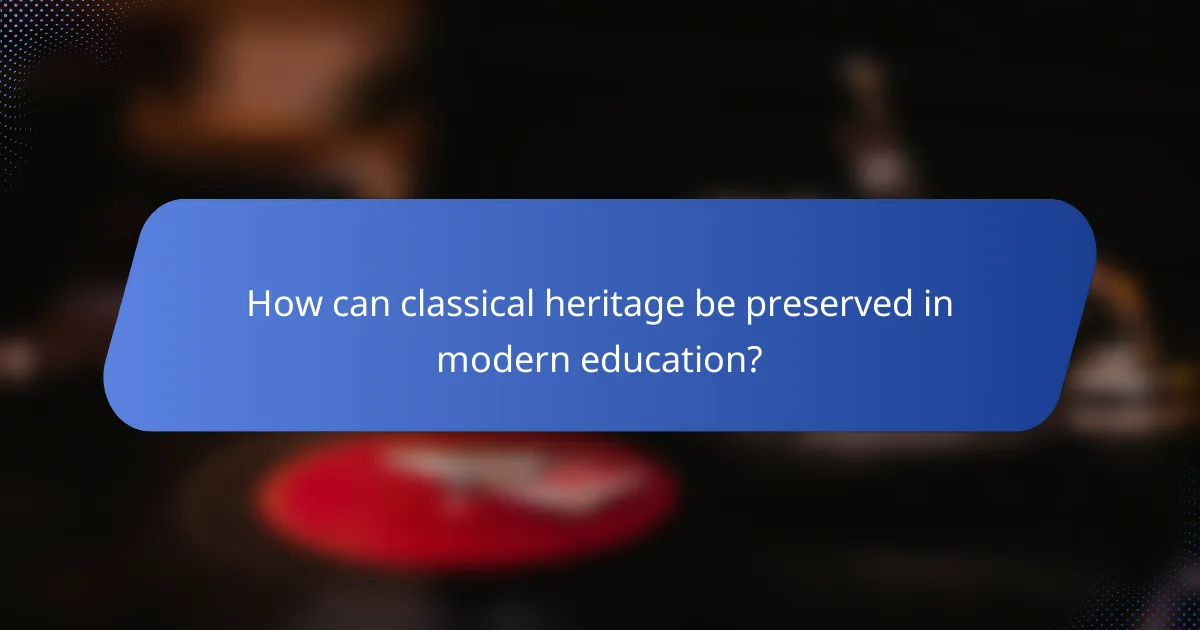
How can classical heritage be preserved in modern education?
Preserving classical heritage in modern education involves integrating classical studies into curricula and fostering community involvement. This approach not only enriches students’ understanding of historical contexts but also promotes appreciation for cultural legacies.
Incorporating classical studies in schools
Integrating classical studies into school curricula can enhance students’ critical thinking and cultural awareness. Schools can offer courses in ancient languages, literature, and philosophy, which provide insights into the foundations of modern society.
Practical steps include developing interdisciplinary programs that connect classical themes with subjects like history, art, and science. For instance, a project could explore the influence of Greek philosophy on modern political thought.
Community engagement through workshops
Workshops can serve as a bridge between classical heritage and the community, allowing participants to engage directly with historical content. These workshops might include hands-on activities, such as reenactments, art creation, or discussions on classical texts.
Local organizations can partner with schools to host these events, making them accessible and relevant. For example, a community workshop could focus on the impact of Roman architecture, encouraging participants to explore local historical sites.
Support from cultural institutions
Cultural institutions, such as museums and libraries, play a crucial role in preserving classical heritage. They can provide resources, expert guidance, and venues for educational programs that highlight classical themes.
Collaboration with these institutions can enhance educational offerings by providing access to artifacts, exhibitions, and lectures. Schools might arrange field trips to museums featuring classical collections, thereby enriching students’ learning experiences.
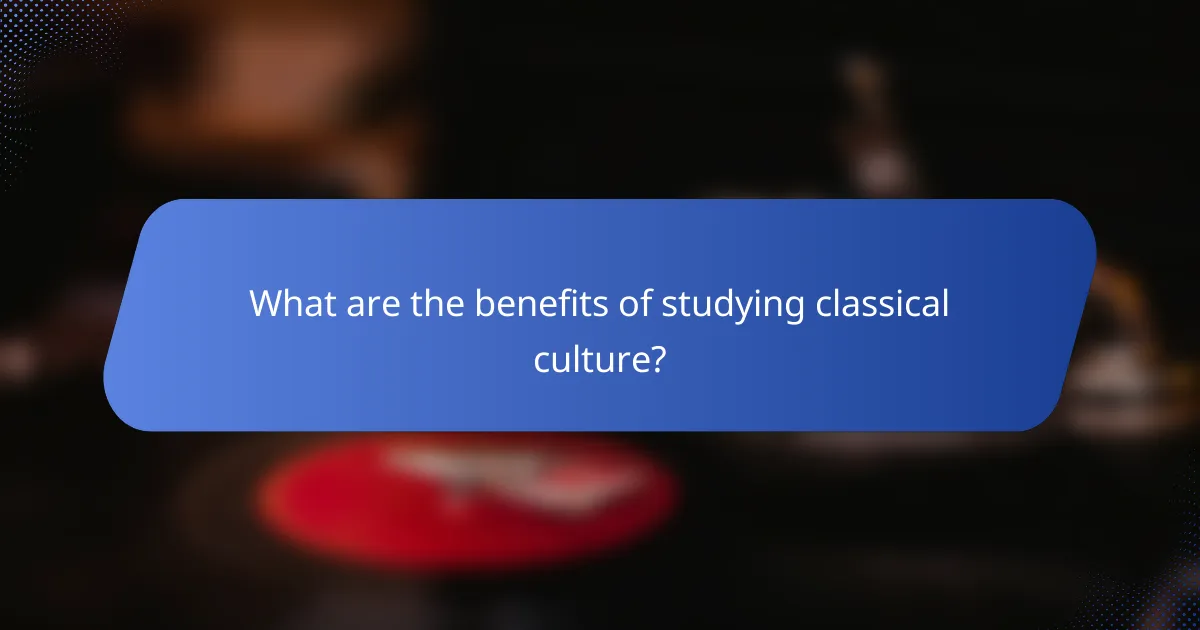
What are the benefits of studying classical culture?
Studying classical culture offers numerous benefits, including enhanced critical thinking and a deeper appreciation for historical influences on modern society. Engaging with classical texts, art, and philosophy enriches one’s understanding of cultural heritage and its ongoing impact.
Development of analytical skills
Engaging with classical culture sharpens analytical skills by encouraging critical examination of texts and ideas. Students learn to dissect arguments, evaluate evidence, and interpret complex narratives, which are essential skills in both academic and professional settings.
For instance, analyzing classical literature often involves understanding various perspectives and motivations, fostering a nuanced approach to problem-solving. This analytical mindset can be applied across disciplines, from law to science, enhancing overall cognitive abilities.
Understanding of historical context
Studying classical culture provides insight into the historical context that shaped contemporary societies. By exploring the philosophies, political systems, and artistic movements of ancient civilizations, learners gain a clearer perspective on modern cultural dynamics.
For example, understanding the democratic principles of ancient Greece can illuminate current political debates. This historical awareness fosters a greater appreciation for the complexities of modern governance and social structures.
Fostering creativity and innovation
Classical culture serves as a rich source of inspiration for creativity and innovation. Exposure to classical art, literature, and philosophy encourages individuals to think outside the box and draw connections between seemingly unrelated ideas.
Many contemporary artists and thinkers reference classical works as a foundation for their own creations. By studying these influences, individuals can cultivate their own unique perspectives and contribute to ongoing cultural dialogues.

What frameworks support classical education in Australia?
In Australia, classical education is supported by a combination of national curriculum guidelines and partnerships with universities. These frameworks ensure that classical methodologies are integrated into the educational system, promoting a comprehensive understanding of the liberal arts and sciences.
National curriculum guidelines
The Australian national curriculum outlines key learning areas that support classical education, including languages, history, and the arts. These guidelines encourage critical thinking and a deep appreciation for cultural heritage, which are central to classical education.
Schools are expected to align their teaching practices with these guidelines, fostering an environment where students can engage with classical texts and ideas. This alignment often includes a focus on Socratic methods and the study of foundational works in literature and philosophy.
Partnerships with universities
Many Australian schools collaborate with universities to enhance classical education through specialized programs and resources. These partnerships often provide access to expert lecturers, workshops, and curriculum development support, enriching the educational experience.
For example, some schools may offer dual-enrollment programs that allow high school students to take university-level courses in classical studies. This not only prepares students for higher education but also deepens their understanding of classical concepts and their relevance today.
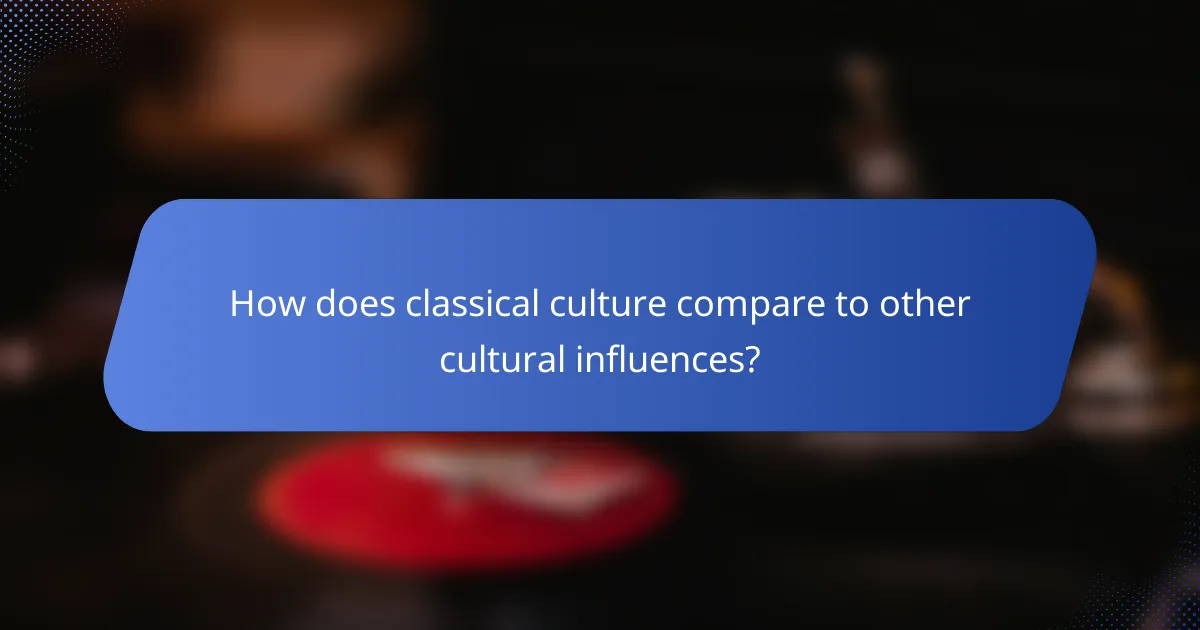
How does classical culture compare to other cultural influences?
Classical culture, rooted in ancient Greece and Rome, has significantly shaped various aspects of modern society, including art, philosophy, and governance. Its influence is distinct yet interwoven with other cultural traditions, leading to a rich tapestry of artistic and intellectual exchange.
Comparison with Indigenous Australian culture
Classical culture and Indigenous Australian culture differ fundamentally in their origins and expressions. While classical culture emphasizes structured forms of art and philosophy, Indigenous Australian culture is deeply connected to the land and oral traditions, focusing on storytelling and community practices.
Despite these differences, there are points of intersection, particularly in the appreciation of nature and spirituality. Both cultures value their histories and traditions, though they manifest in unique ways that reflect their respective environments and societal structures.
Interactions with contemporary art movements
Classical culture has profoundly influenced contemporary art movements, serving as a foundation for styles such as neoclassicism and romanticism. Artists often draw inspiration from classical themes, techniques, and aesthetics, blending them with modern concepts to create innovative works.
Contemporary artists may reinterpret classical motifs to address current social issues or personal narratives, demonstrating the adaptability of classical influences. This interaction encourages a dialogue between the past and present, allowing for a richer understanding of both classical and contemporary art.




